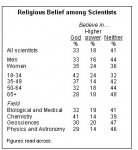- Joined
- Sep 7, 2010
- Messages
- 26,526
- Reaction score
- 9,462
- Location
- Alabama
- Gender
- Male
- Political Leaning
- Conservative
No, words can have different meanings in different contexts.
And theories can be scientifically proven.
wrong, as usual. you are confusing "scientifically accepted" with "scientifically proven". they are not the same.


